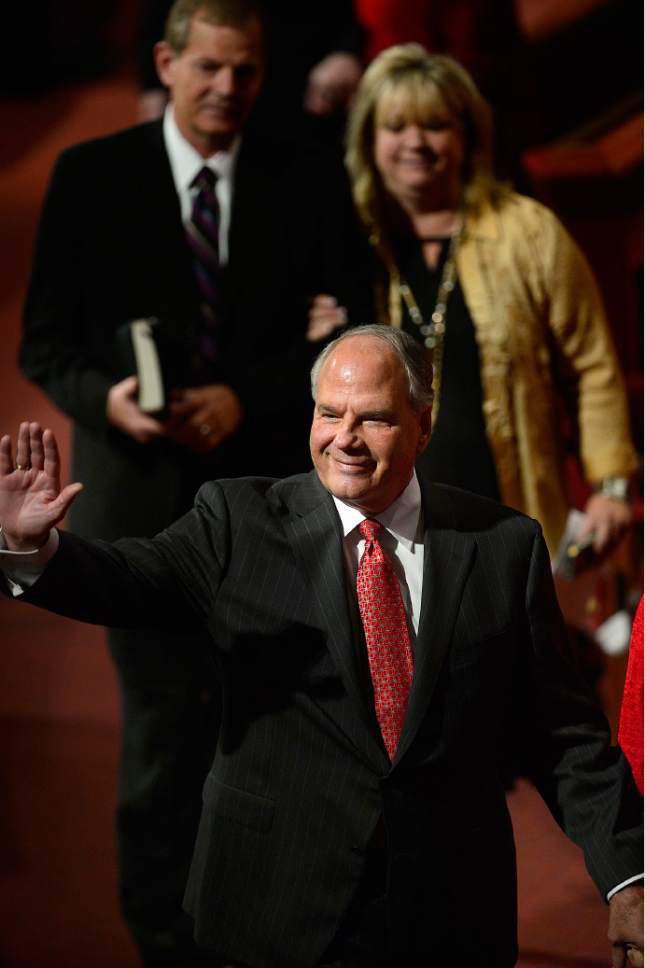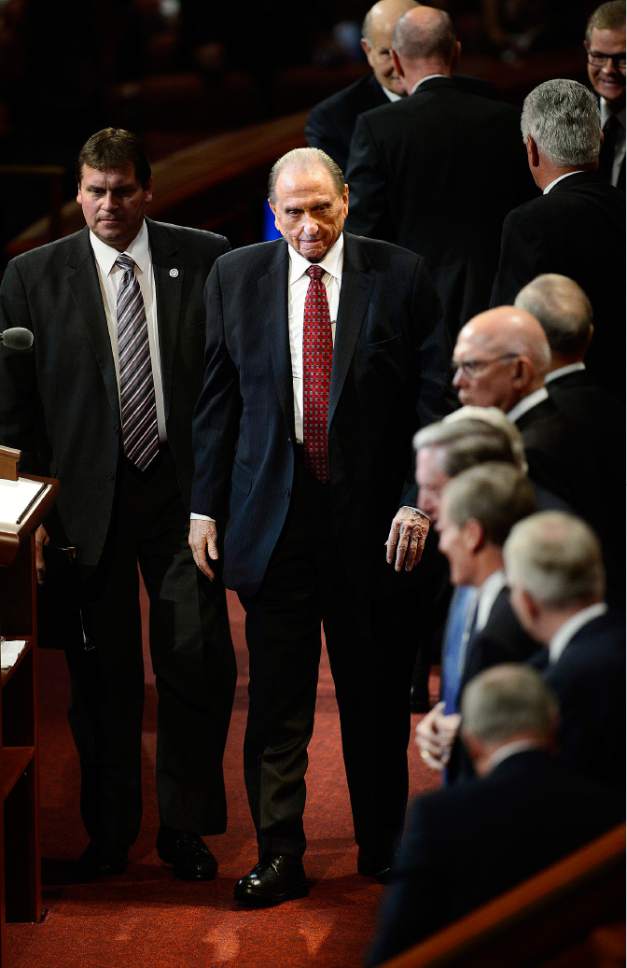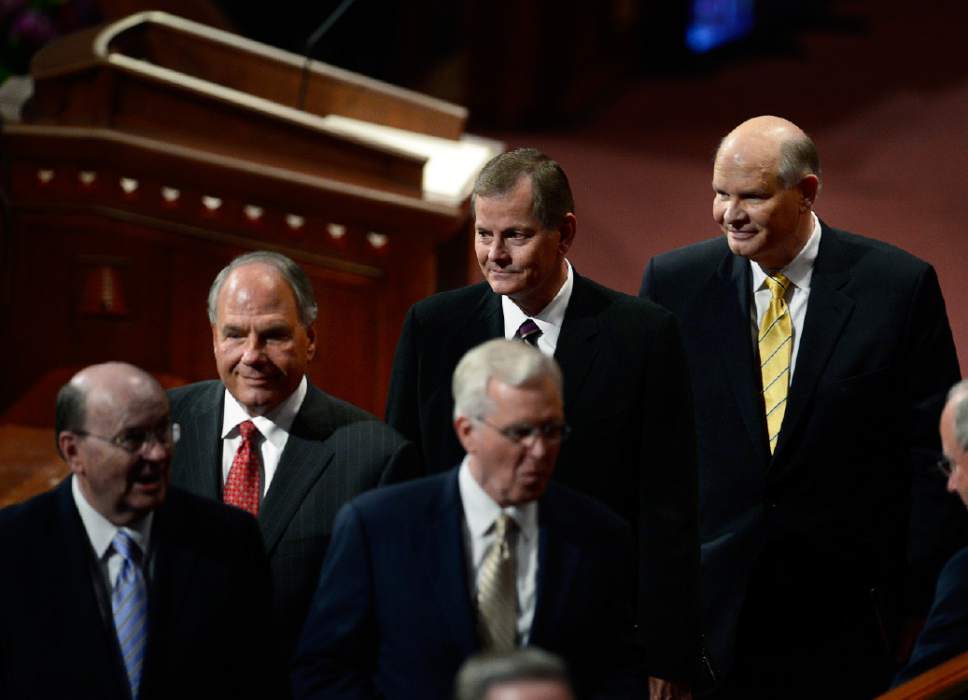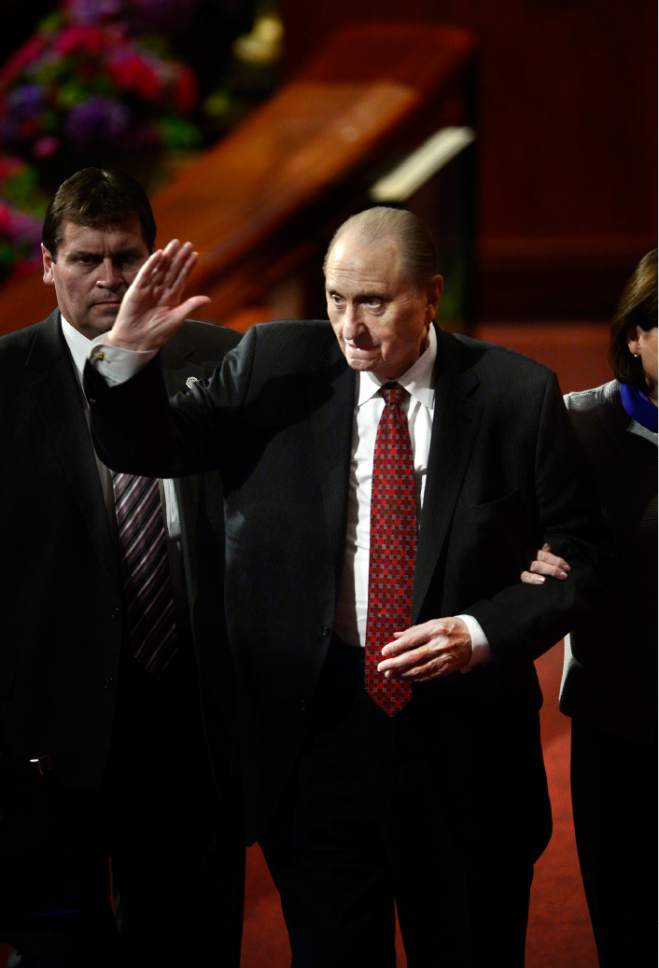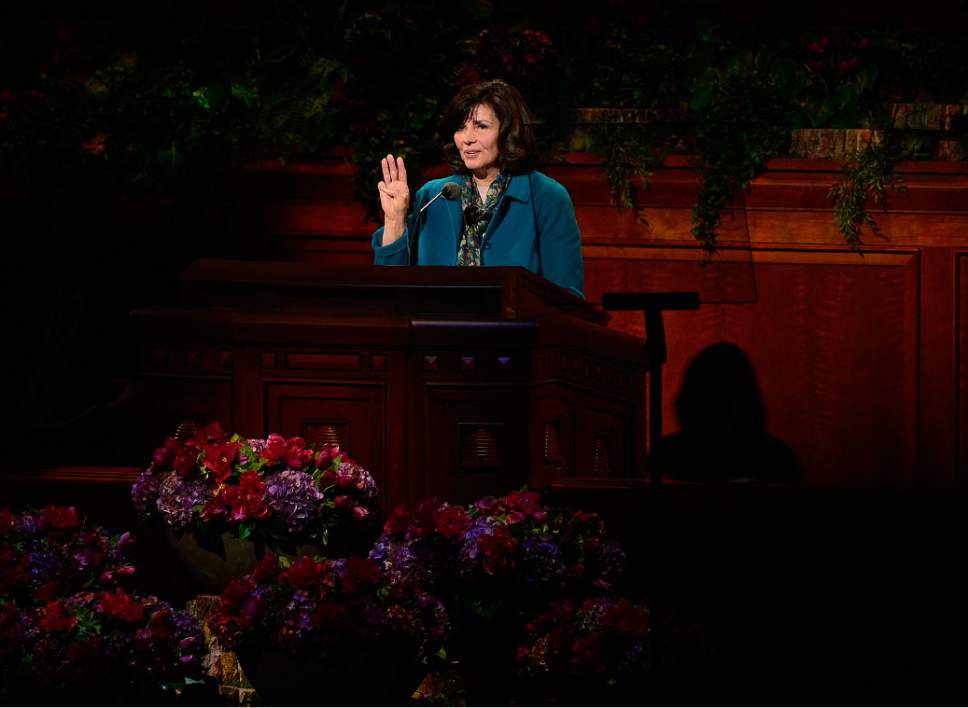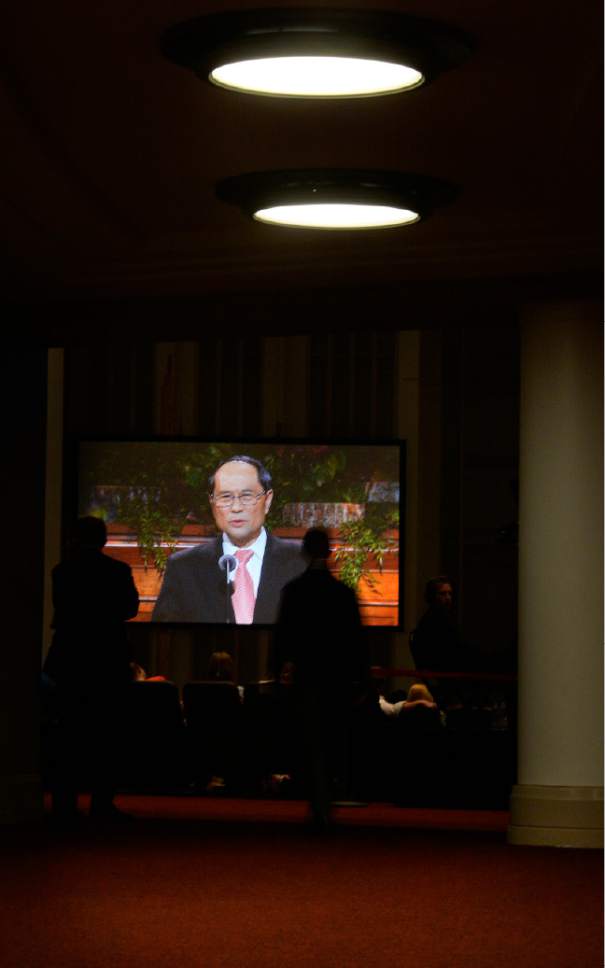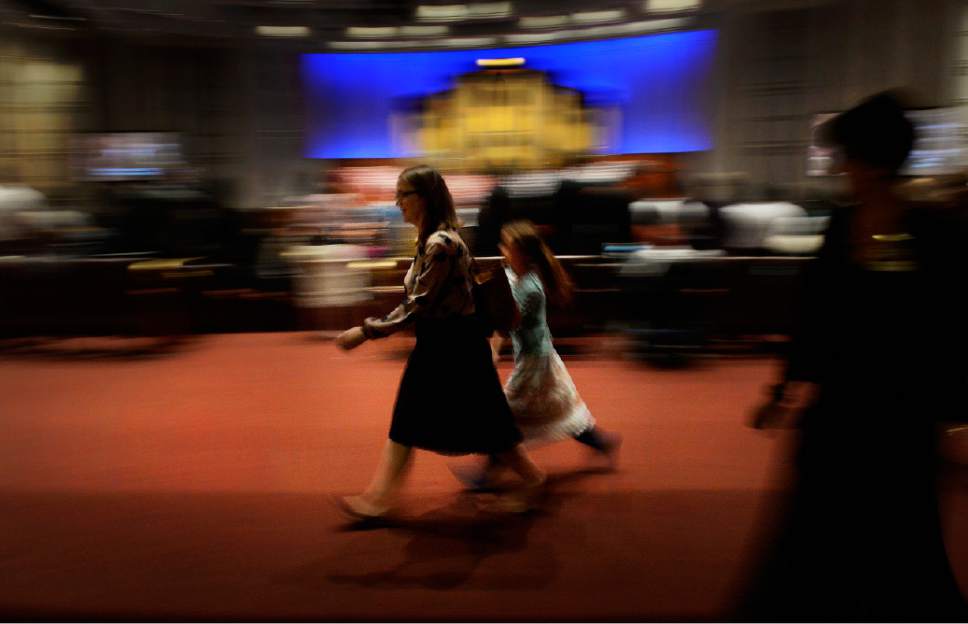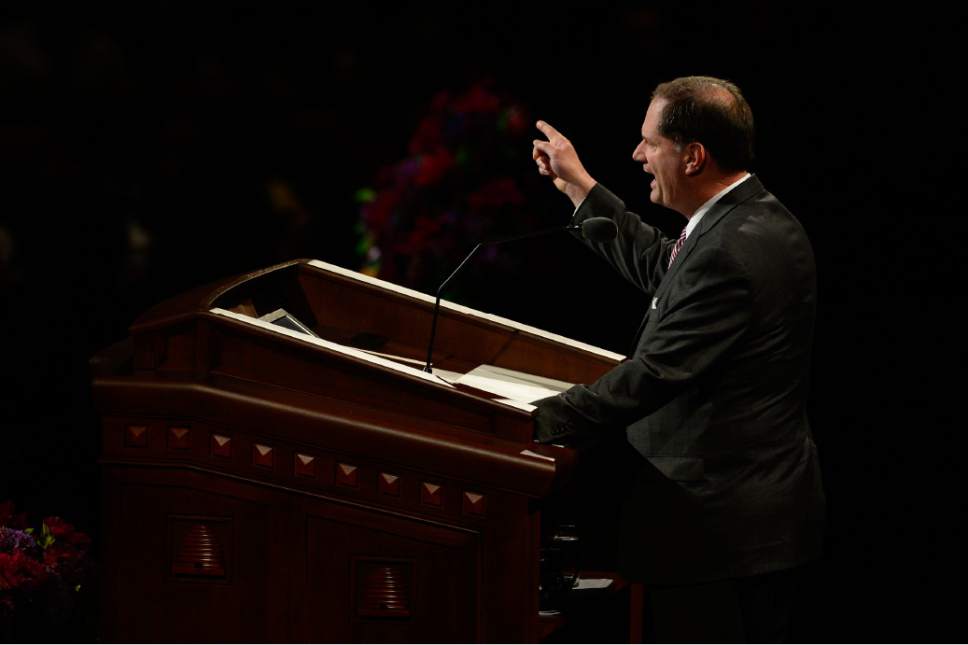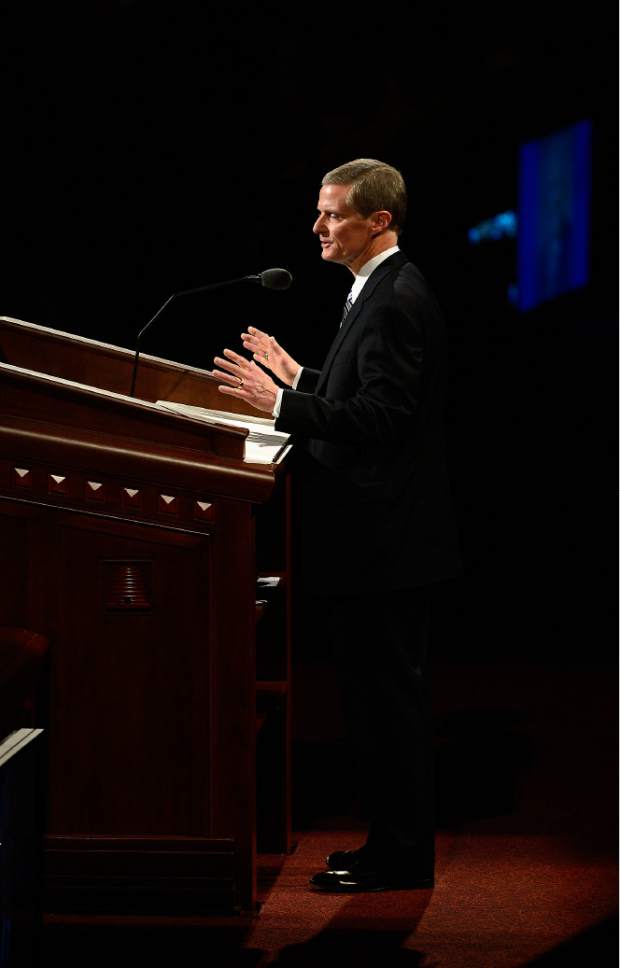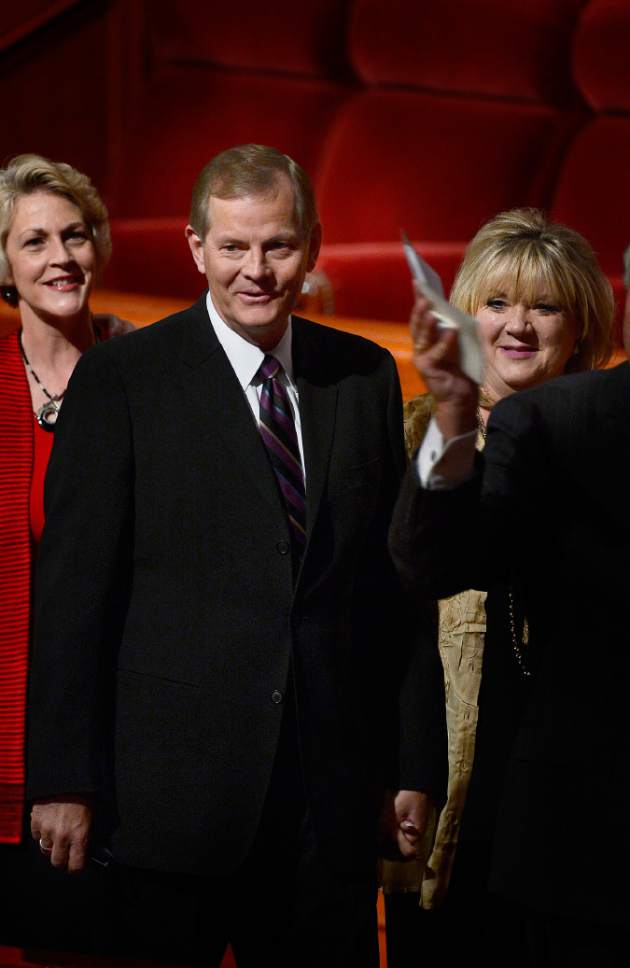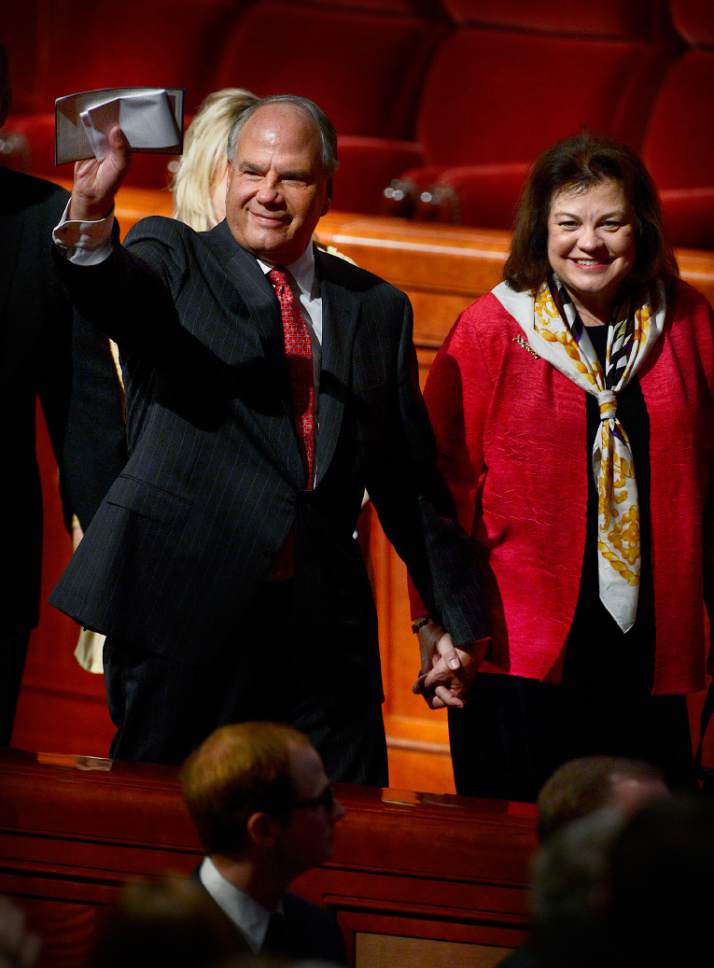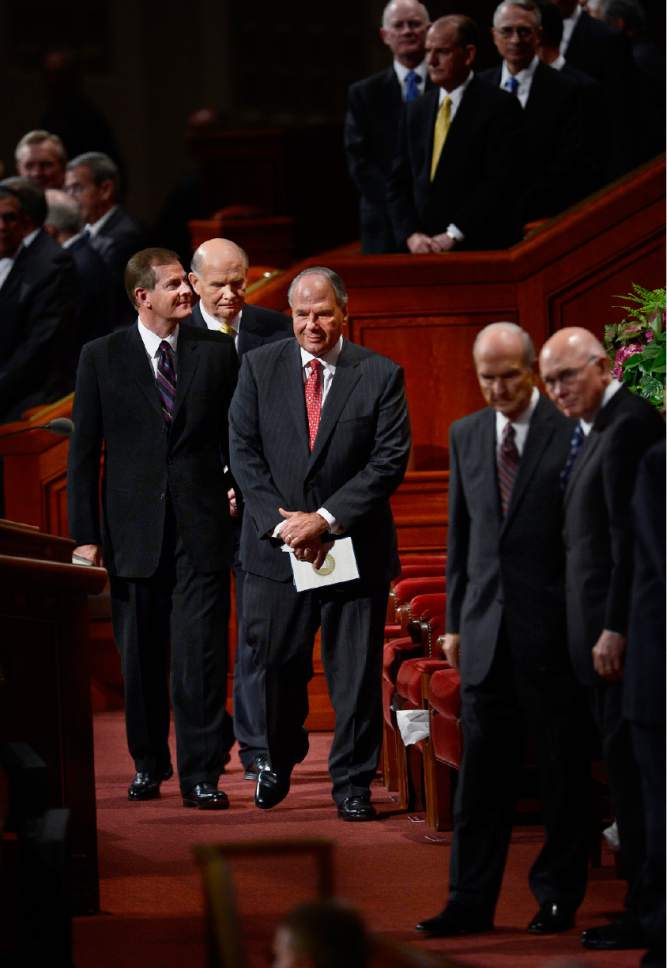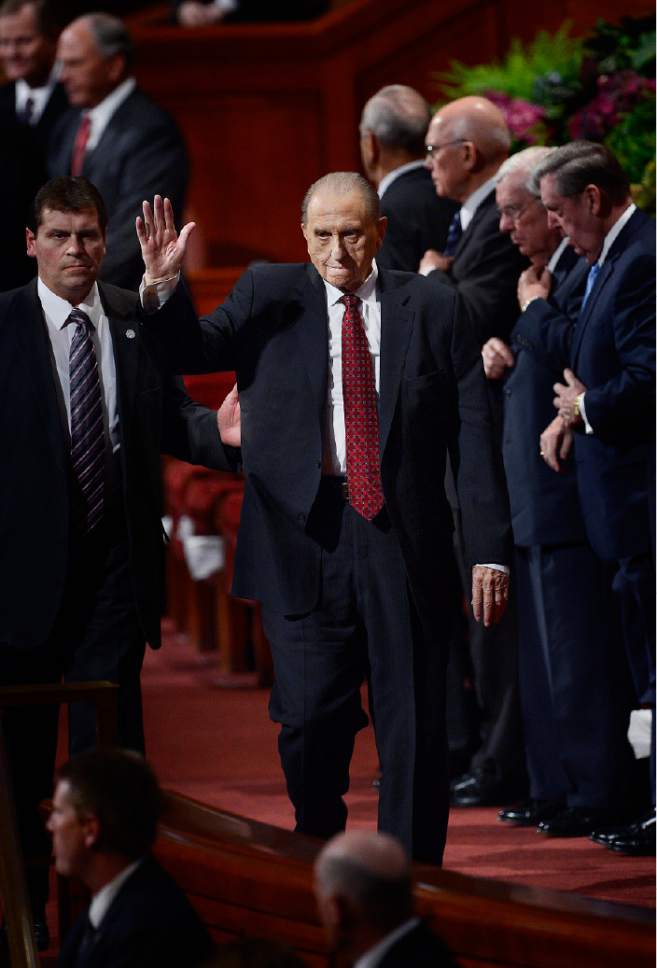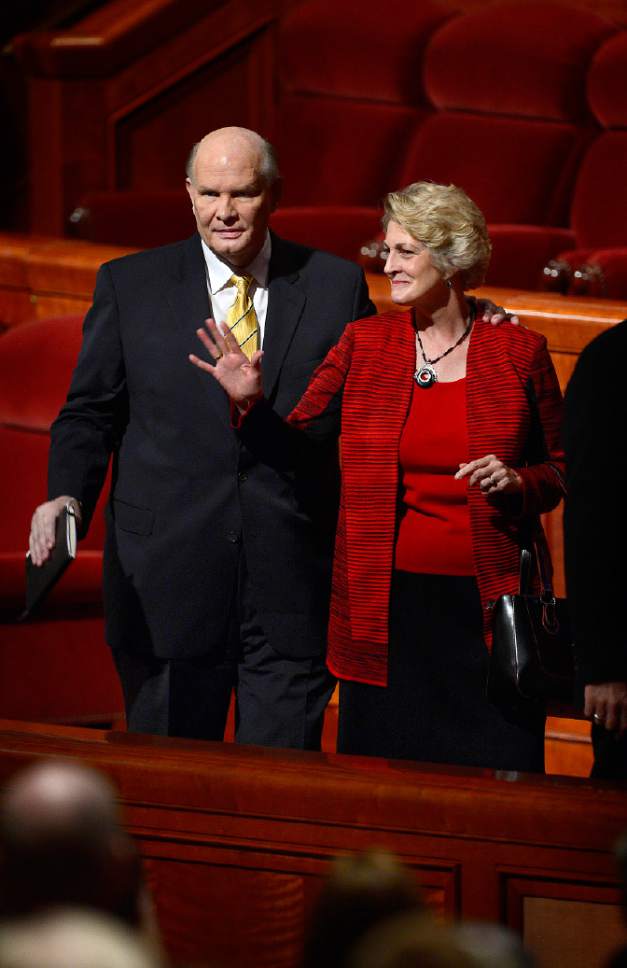This is an archived article that was published on sltrib.com in 2015, and information in the article may be outdated. It is provided only for personal research purposes and may not be reprinted.
Mormon women need to "speak up and speak out" during leadership meetings in their LDS congregations — and in their homes — to benefit fellow worshippers, influence their families and take their "rightful" place in the faith.
Russell M. Nelson, newly installed president of the Utah-based Quorum of the Twelve Apostles, delivered that message Sunday during the 185th semiannual General Conference of The Church of Jesus Christ of Latter-day Saints.
Speaking to 20,000-plus at the Conference Center in downtown Salt Lake City — and millions more watching and listening around the globe — Nelson issued a clarion call for Mormon women to provide more leadership and influence.
He pleaded with them "to step forward. Take your rightful and needful place in your home, in your community, and in the kingdom of God — more than you ever have before."
Nelson's words come amid a continuing debate — and evolution — about the role of women inside the LDS Church. Some are calling for female ordination to the all-male Mormon priesthood; others are seeking more visibility and greater roles in decision-making.
In recent months, the church has added its top female leaders to previously all-male councils. Similar inclusion has taken place in local Mormon congregations, which are shepherded by lay leaders.
The 91-year-old Nelson, first in line for the faith's presidency, said many women have brought inspiration to other LDS leaders as they met together seeking solutions to problems, and more such influence is needed.
"We need your impressions, your insights and your inspiration. We need you to speak up and speak out in ward and stake councils. We need each married sister to speak as a 'contributing and full partner' as you unite with your husband in governing your family," he said. "Married or single, you sisters possess distinctive capabilities and special intuition you have received as gifts from God. We brethren cannot duplicate your unique influence."
Mormon leaders directed that all of this weekend's talks were to be given in English — unlike recent conferences when some speakers delivered their sermons in their native languages.
Here are summaries of key Sunday speeches:
MORNING SESSION
Thomas S. Monson • The LDS Church president, delivering his first address this weekend to the general membership of the faith, welcomed three new apostles as he opened the Sunday morning session and mourned the loss of the three men they replaced.
He said the newcomers — Ronald A. Rasband, Gary E. Stevenson and Dale G. Renlund — "are men dedicated to the work of the Lord. They are well qualified to fill the important positions to which they have been called."
Monson also lamented the deaths of the men they replaced, Boyd K. Packer, L. Tom Perry and Richard G. Scott. "How grateful we are for their examples of Christ-like love for the inspired teaching they have left to all of us."
Monson urged church members to be a light in the lives of others by following the example of Jesus Christ.
"We will stand out from the crowd because we are different," he said. "We will stand out because we dress modestly. We will be different because we do not use profanity and because we do not partake of substances which are harmful to our bodies. We will be different because we avoid off-color humor and degrading comments."
He added, "We will be different as we decide not to fill our minds with media choices that are base and demeaning and that will remove the spirit from our homes and our lives. We will certainly stand out as we make choices regarding morality — choices which adhere to gospel principles and standards."
Monson urged Mormons to replace their doubts with faith.
"Amidst the confusion of our age, the conflicts of conscience and the turmoil of daily living, an abiding faith becomes an anchor to our lives," he said. "Remember that faith and doubt cannot exist in the same mind at the same time, for one will dispel the other."
Near the end of his sermon, Monson appeared to grow weak at the pulpit and his voice started to trail off. He finished his talk and was helped to his seat.
Earlier this year, the church issued a news release stating that the 88-year-old leader was "feeling the effects of advancing age."
Monson returned to the Sunday afternoon meeting and attended all six sessions of this conference stretched over two weekends.
Ronald A. Rasband • The new apostle told about how overwhelming his calling was and talked about the love that Christ offers to all.
He said Monson told him that his new call comes from Christ. "I am overwhelmed and shaken to my very core to consider the import and significance of those words so tenderly spoken by our loving prophet" and vowed that he "will serve the Lord and you, with all of my heart, might, mind and strength."
Rasband, who was the senior president of the LDS Quorums of the Seventy, talked about the love of Christ, saying "I'm confident that there is no choice, sin or mistake that you or anyone else can make that will change his love for you or for them."
He added, "That does not mean he excuses or condones sinful conduct. I'm sure he does not. But it does mean we are to reach out to our fellowman in love to invite, persuade, serve and to rescue. Jesus Christ looked past people's ethnicity, rank and circumstances in order to teach them this profound truth."
Gary E. Stevenson • The new apostle, who has been serving as the church's presiding bishop, told how his new calling astounded him and how the Lord is helping him.
He said when Monson asked him if he would accept, "Following what I am sure was a very undignified audible gasp, in complete shock, I responded affirmatively."
Stevenson said he was then overcome by "a tsunami of indescribable emotion, most of which were feelings of inadequacy." Stevenson said the Mormon prophet told him that the Lord helps those whom he calls.
Stevenson said as he struggled with his inadequacies, "I received a distinct impression which both chastened and comforted me: to focus not on what I can't do, but rather on what I can do. I can testify of the plain and precious truths of the gospel."
He testified about some of those truths. "God is our Heavenly Father. We are his children. He weeps with us when we suffer and rejoices when we do what is right. He wants to communicate with us and we can communicate with him through sincere prayer. Heavenly Father has provided us, his children, with a way to return to live in his presence."
Dale G. Renlund • The retired cardiologist pledged as a new apostle — the 100th in Mormon history — to see others as children of God and to give them the care that a loving Heavenly Father would want.
"This calling is not about me," he said. "It's about the Lord, his work and Heavenly Father's children."
Renlund told how one of his young heart patients did well for about 15 years, but died as a still-young man. "I thought to myself, 'Chad had good care. He has had many more years of life than he otherwise would have had.' "
But he said the emotional distance was shattered when Chad's parents came into the room and saw their dead son.
"I saw the great hopes and expectations they had for him, the desire they had that he would live just a little bit longer and a little bit better. With this realization, I began to weep. In an ironic reversal of roles and in an act of kindness I will never forget, Chad's parents comforted me."
Renlund added, "I now realize that to effectively serve others, we must see them through a parent's eyes, through Heavenly Father's eyes. Only then can we begin to comprehend the true worth of a soul."
Gregory A. Schwitzer • It is time for Latter-day Saints to stand up and help overcome deception from the truth that is rampant in the world, the member of the Seventy said.
"If ever there was a time that the world needs disciples of Christ who can communicate the gospel message with clarity and from the heart, it is now," Schwitzer said. "We need the clarion call of the trumpet."
He said many in the world "try to drown out the simple message of the gospel by attacking some aspect of the church's history or offering pointed criticism of a prophet or other leader."
Mormons, Schwitzer added, should spread the simple message that God lives and has living prophets showing the way to happiness, which is "through the basic family unit as originally organized and revealed by our Heavenly Father."
"As Latter-day Saints, it is time for us to stand up and testify. If is time for the notes of the melody of the gospel to arise above the noise of the world."
Claudio R.M. Costa • Remembering Christ and his life will make the Sabbath and the church's sacrament more enjoyable and meaningful, said the member of the Seventy.
"In so doing," he said, "we create traditions that build our faith and testimony, and also protect our testimony."
Costa said Mormons vow as they take the sacrament weekly to "always remember him." He said the sacrament prayers promise that those who do will always have the spirit with them to guide them.
"The sacrament is also a time for Heavenly Father to teach us about the atonement of his beloved son, our Savior Jesus Christ, and for us to receive revelation about it" as they ponder his life.
"It is time for us to reverently ask God for this knowledge," Costa said, "and if we do, I have no doubt that we will receive this knowledge, which will bless our lives beyond measure."
Henry B. Eyring • The Holy Ghost can be a constant companion to help through life's troubles and temptation, said Monson's first counselor in the ruling LDS First Presidency.
He urged Mormons to live righteously to claim that gift, as was promised to them when they were baptized. "We can, if we live worthy of it, have the blessing of the Spirit to be with us, not only now and then, but always."
Eyring said the spirit will strengthen against temptation, help discern between truth and falsehood, and reveal truths "that mark the way home to God."
"As you obey, the impressions from the Spirit will come more frequently, closer and closer to constant companionship," he said. "Your power to choose the right will increase."
Eyring said his father was a well-known scientist, but he relied on the Spirit instead of laboratory-type experiments to learn many religious truths. He said his father once wanted to attend a sacrament meeting while visiting Australia and followed spiritual promptings about where to turn in the streets until he found one.
When Eyring's mother died, his father felt, through the Spirit, that she had been welcomed home in heaven with honor. "For my dad, that was more than a hope. The Holy Ghost had made it a reality for him."
AFTERNOON SESSION
D. Todd Christofferson • Jesus Christ formed a church — rather than asking people to rely on purely personal worship — so that its members could band together to help one another and spread the gospel, the apostle said.
"It is important to recognize that God's ultimate purpose is our progress," he said. "One cannot fully achieve this in isolation, so a major reason the Lord has a church is to create a community of saints that will sustain one another in the 'straight and narrow path that leads to eternal life.' "
Working as a group helps accomplish things that members could not do as well on their own, including dealing with poverty and building temples — and warning and helping one another when they stray.
"Without the capabilities of his church in place," he said, "the Savior's commission to take the gospel to all the world could not be realized."
The church was also established because it is "the kingdom of God on the Earth," Christofferson said. "With the keys of the kingdom, the Lord's servants can identify both truth and falsehood, and once again authoritatively state, 'Thus saith the Lord.' "
Devin G. Durrant • He invited church members to "ponderize" a different scripture every week as a way to chase away bad thoughts and grow closer to god.
"The word 'ponderize' is not found in the dictionary, but it has found a place in my heart," said the first counselor in the church's Sunday School general presidency, also well-known as a former BYU basketball star. "I like to say it's a combination of 80 percent extended pondering and 20 percent memorization."
If an effort is made to think about the same scripture many times a day over a week, Durrant said, "you will feel an increase in spirituality. You will also be able to teach and lift those you love in more meaningful ways."
He said such effort is needed in "a time of every-spreading evil. We cannot just accept the status quo and be fed ugly words and sinful visuals everywhere we turn and do nothing in response. We must fight back. When our minds are filled with uplifting thoughts and images, when we 'always remember him,' there is no room left for filth and trash."
Durrant added, "Ponderizing is somewhat like adding a new time-release vitamin to your current spiritual diet."
Von G. Keetch • God's commandments provide safety often in ways not seen, said the member of the Seventy.
He illustrated that by telling about a time he saw some American surfers complain that a barrier placed in an Australian bay was ruining their ability to ride big waves. An older, local man then offered them some binoculars and pointed beyond the barrier.
"I could see something that I had not been able to see before: dorsal fins — large sharks feeding near the reef on the other side of the barrier," which the barrier kept away from surfers, Keetch said.
The man told the surfers, "Don't be too critical of the barrier. … It's the only thing that is keeping you from being devoured."
"With our new understanding of the danger that lurked just below the surface," Keetch said, "the barrier now offered protection, safety and peace."
He said commandments also may sometimes seem like unwanted barriers, but bring safety.
"We show our love for God — and our faith in him — by doing our best every day to follow the course that he has laid out for us," Keetch said, "and by keeping the commandments that he has given to us."
Carole M. Stephens • The first counselor in the women's Relief Society general presidency said God gives laws to his followers out of love.
Such commandments, said Stephens, the second female speaker at this weekend's sessions, are "vital instructions to teach, guide and protect us as we 'gain earthly experience.' "
Some may see such instructions as "limitations," she said, that "restrict our personal freedom, take from us our agency, and limit our growth."
But if believers will obey these commandments, recognizing they are based on God's love, Stephens said, the "ability to hear and feel the promptings of the Spirit" will be enhanced.
"God never loses sight of our eternal potential," she said, "even when we do."
Allen D. Haynie • While Christ has paid the price for sin, the member of the Seventy said people must still repent to take advantage of that atonement and eventually enter the presence of God.
He explained with a story from his childhood. After he swam in a muddy hole, his grandmother stopped him from entering the house because it would make filthy the home that she had just cleaned.
"I found myself standing in the backyard while my grandmother sprayed me off with a hose" before he was clean enough to enter. Similarly, "We should not deceive ourselves about what it takes to return and remain in the presence of our Father in Heaven. We have to be clean."
He said Christ made that possible. "What does he ask us to do in return? He simply pleads with us to confess our sins and repent so that we will not have to suffer as he did. He invites us to become clean so that we are not left outside of our Father in Heaven's house."
Kim B. Clark • The member of the Seventy said today's Mormons live in "a time of great evil and temptation, a time of confusion and commotion."
Whatever level "of spirituality or faith or obedience" the faithful have achieved will not be enough "for the work that lies ahead," said Clark, the former president of BYU-Idaho. "We need greater spiritual light and power. We need to see more clearly the Savior working in our lives and ears to hear his voice in our hearts."
Koichi Aoyagi • Trials are necessary to help us learn and grow, according to the member of the Seventy.
"The trials of this Earth — including illness and death — are part of the plan of salvation," he said, "and are inevitable experiences."
Aoyagi said it took trials of his own to help him truly understand that. One was a traffic accident that could have killed him, but for years left him in pain and made it difficult to sleep.
He prayed to be healed, but that did not happen. "Feelings of doubt also began creeping into my mind, and I wondered, 'Why do I have to suffer this much pain?' "
He said he learned "that my sufferings were for my learning and for my growth. Heavenly Father schooled me to temper my patience, to develop empathy, and to comfort those who are suffering."
David Noyce and Peggy Fletcher Stack contributed to this story.


